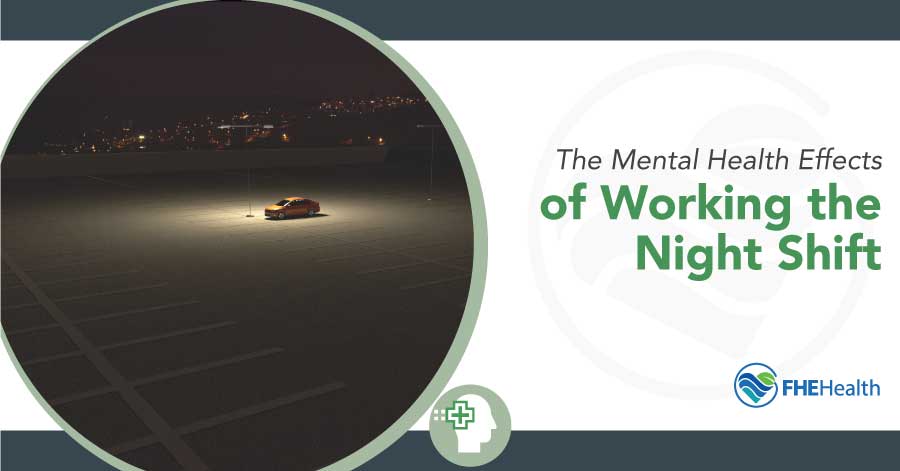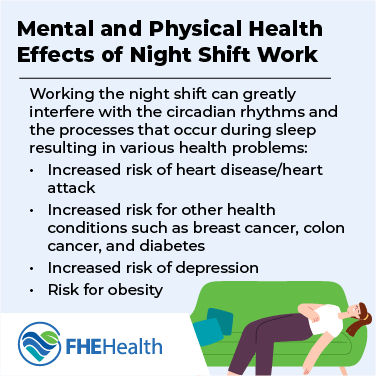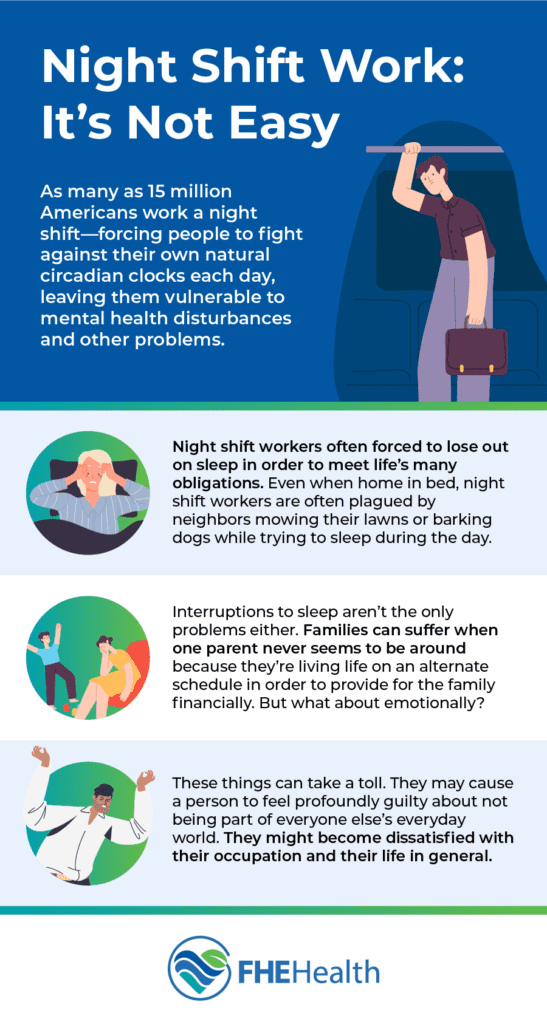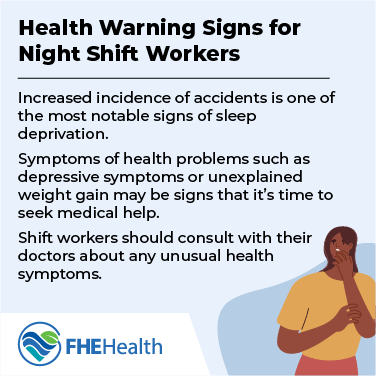
As many as 15 million Americans work a night shift— either permanently or on a rotating shift. According to the American Psychological Association, that’s a concern because it forces people to fight against their own natural circadian clocks each day, leaving them vulnerable to mental health disturbances and other problems. Many shift workers struggle with chronic fatigue, and that can leave them feeling irritable and even depressed.
Understanding the risks may help many workers develop strategies for coping with them. The need for night shift work is ever-present in many industries, including the healthcare industry. By learning how to work the night shift and stay healthy, workers can not only protect their physical health but their psychological health, too.
Night Shift Work: It’s Not Easy
One of the more difficult things about night shift work is that the rest of the world, very clearly, is on the day shift. Night shift workers who have families or need to shop, visit their doctor, or take in their car to be fixed, for example, are often forced to lose out on sleep to meet life’s many obligations. Even when home in bed, night shift workers are often plagued by neighbors mowing their lawns or barking dogs while trying to sleep during the day. Delivery people may knock on the door. Children yell up and down the street. Getting optimum sleep on a routine basis is a difficult prospect for many.
Interruptions to sleep aren’t the only problems either. There may be negative effects on relationships. Couples have less time to enjoy some of the most commonplace things, like conversing or watching television together. Families can suffer when one parent never seems to be around because they’re living life on an alternate schedule to provide for the family financially. But what about emotionally?
These things can take a toll. They may cause a person to feel profoundly guilty about not being part of everyone else’s everyday world. They might become dissatisfied with their occupation and their life in general. Sometimes these are reasons to quit night shift work. However, that’s not always possible for some people to manage in the short term.
Mental and Physical Health Effects of Night Shift Work
 Working the night shift can negatively impact both physical and mental health. First, it’s important to recognize why maintaining our natural sleep rhythm is important. Sleep isn’t only essential for getting adequate rest. While we sleep, our bodies work to get rid of toxins, make repairs, and unwind from stress. Working the night shift can greatly interfere with the circadian rhythms and the processes that occur during sleep.
Working the night shift can negatively impact both physical and mental health. First, it’s important to recognize why maintaining our natural sleep rhythm is important. Sleep isn’t only essential for getting adequate rest. While we sleep, our bodies work to get rid of toxins, make repairs, and unwind from stress. Working the night shift can greatly interfere with the circadian rhythms and the processes that occur during sleep.
These disturbances can result in various physical and mental health problems:
- Increased risk of heart disease/heart attack: A British study determined that people who worked the night shift were at a 7 percent-increased risk for heart attack. Researchers believe that changes in sleep patterns could negatively impact blood pressure and circulation.
- Increased risk of depression: Lack of natural light stimulus during daylight hours is associated with a form of depression. Shift workers who miss out on natural light during the day and are subjected to brightly lit, artificial lighting during the evening are vulnerable to developing a depressive state that is closely related to seasonal affective disorder. Night shift workers can develop depression for other reasons related to this type of work as well. The work may negatively affect their relationships, family, and other aspects of their life and can cause chronic stress, which, in turn, can eventually lead to depression or other mood disorders.
- Risk for obesity: Some researchers have concluded that night shift work is associated with a greater risk for obesity. This is because sleep disturbance can lead to an imbalance in hormones. It can cause a person’s metabolism to go off kilter. Even when a person eats healthy, they may still wind up gaining weight because their hormones are out of whack.
- Increased risk for other health conditions: Shift workers may also be at a heightened risk of breast cancer, colon cancer, diabetes, or other diseases. Diabetes can develop in conjunction with metabolic disturbances and obesity. A person may become more vulnerable to the development of cancer because they lack vitamin D, a nutrient that we absorb from the sun.
Not everyone who works the night shift, of course, will develop these health issues, but it’s important for workers to understand the risks and why it’s so essential that they take steps to protect their mental and physical health.

 There are some warning signs that night shift workers should be on the lookout for to help them determine if their work is causing a problem. One of the most notable signs of sleep deprivation, for example, is an increased incidence of accidents. People who don’t have adequate sleep are more likely to suffer an injury from a fall, for instance. They may begin to make mistakes that they would not ordinarily make on the job.
There are some warning signs that night shift workers should be on the lookout for to help them determine if their work is causing a problem. One of the most notable signs of sleep deprivation, for example, is an increased incidence of accidents. People who don’t have adequate sleep are more likely to suffer an injury from a fall, for instance. They may begin to make mistakes that they would not ordinarily make on the job.








